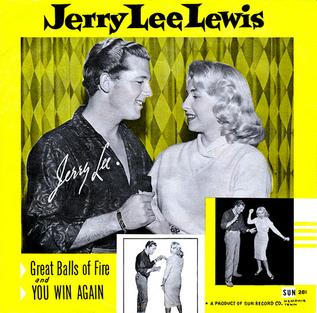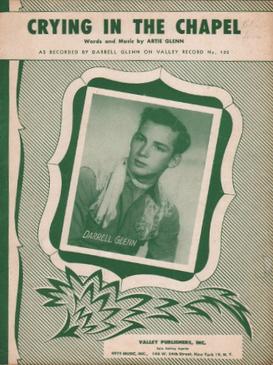Related Research Articles

"Great Balls of Fire" is a 1957 popular song recorded by American rock and roll musician Jerry Lee Lewis on Sun Records and featured in the 1957 movie Jamboree. It was written by Otis Blackwell and Jack Hammer. The Jerry Lee Lewis 1957 recording was ranked as the 96th greatest song ever by Rolling Stone. It is written in AABA form. It sold one million copies in its first 10 days of release in the United States making it one of the best-selling singles in the United States at that time.

Guy Mitchell was an American pop singer and actor, successful in his homeland, the UK, and Australia. He sold 44 million records, including six million-selling singles. His best-known songs include "My Heart Cries for You", "Heartaches by the Number" and "Singing the Blues".
"It's Over" is an American song composed by Roy Orbison and Bill Dees and sung by Orbison. The single was produced by Fred Foster and engineered by Bill Porter.
"Answer Me" is a popular song, originally titled "Mütterlein", with German lyrics by Gerhard Winkler and Fred Rauch. "Mütterlein" was published on 19 April 1952. English lyrics were written by Carl Sigman, and the song was published as "Answer Me" in New York on 13 October 1953. Contemporary recordings of the English lyric by Frankie Laine and David Whitfield both topped the UK Singles Chart in 1953.

"Here in My Heart" is a popular song written by Pat Genaro, Lou Levinson, and Bill Borrelli, first published in 1952.
"I Believe" is a popular song written by Ervin Drake, Irvin Abraham, Jack Mendelsohn and Al Stillman in 1953. The most popular version was recorded by Italian-American singer Frankie Laine, and spent eighteen weeks at No. 1 on the UK Singles Chart.
"Don't Let the Stars Get in Your Eyes" is a country song about a man away from home who is worried that his paramour may unwittingly stray from their relationship. It was written by Winston L. Moore and published in 1952. The song has been recorded in many different styles by many performers, with Perry Como's version hitting number 1 in both the US and UK.
"The Song from Moulin Rouge", sub-titled "Where Is Your Heart", is a popular song that first appeared in the 1952 film Moulin Rouge. It became a No. 1 hit in the UK Singles Chart when recorded by Mantovani. The music for the film was written by Georges Auric; the original French lyrics were by Jacques Larue, with the English words by William Engvick. The Auric-Engvick song was published in 1953.
"I'm Walking Behind You" is a popular song which was written by Billy Reid and published in 1953. The recording by American singer Eddie Fisher was a No. 1 hit in both the US and UK Singles charts, but it had previously been recorded by Reid's former partner, Dorothy Squires, who had a hit with the song in the UK.
"Hold My Hand" is a popular song, written by Jack Lawrence and Richard Myers. It was written in 1950 but not published until 1953.
"You Belong to Me" is a popular music ballad from the 1950s. It is well known for its opening line, "See the pyramids along the Nile". The song was published in Hollywood on April 21, 1952, and the most popular version was by Jo Stafford, reaching No. 1 on both the UK and US singles charts.

David Whitfield was a popular British male tenor vocalist from Hull. He became the first British artist to have a number one single in the UK with "Cara Mia", featuring Mantovani and his orchestra. He died from a brain haemorrhage in Sydney, Australia, while on tour at the age of 54.

"Crying in the Chapel" is a song written by Artie Glenn and recorded by his son Darrell Glenn. The song was released in 1953 and reached number six on the Billboard chart.
"A Woman in Love" is a popular song. It was written by Frank Loesser and published in 1955. It was introduced in Samuel Goldwyn's 1955 cinematic adaptation of the Broadway musical Guys and Dolls, for which Loesser contributed three new songs – including "A Woman in Love" – which had not been in the original stage production. In the film, it was sung as a duet between Marlon Brando and Jean Simmons. The cover version by Frankie Laine reached number 1 in the UK Singles Chart in 1956.
"Comes A-Long A-Love" was a hit single for American singer Kay Starr. The song was released in 1952 and was written by the former Tin Pan Alley songwriter Al Sherman. The melody was adapted from the final part of the overture to Gioachino Rossini's opera Semiramide. "Comes A-Long A-Love" was the last hit song Sherman would write, before handing the reins over to his sons, Bob and Dick Sherman, who were just beginning their songwriting careers. The song was first published on June 9, 1952.
"Look at That Girl" is a 1953 popular song, which was written by Bob Merrill. The song was recorded by Guy Mitchell and produced by Mitch Miller, giving Mitchell his second number one on the UK Singles Chart, where it spent six weeks at the top.
"Hey Joe!" is a 1953 popular song written by Boudleaux Bryant. It was recorded by Carl Smith for Columbia Records on 19 May 1953 and spent eight weeks at No. 1 on the US country music chart, marking Bryant's first no. 1 record. He later wrote songs with his wife Felice for The Everly Brothers. The song was first published in New York on July 17, 1953 as "Hey, Joe".
"Outside of Heaven" is a popular music song written by Sammy Gallop and Chester Conn. A recording by Eddie Fisher with Hugo Winterhalter's orchestra and chorus was made at Manhattan Center, New York City, on July 19, 1952, produced by Winterhalter. It was issued by RCA Victor with the catalog number 20-4953 and by EMI Records on the His Master's Voice label as catalog number B 10362.
"Broken Wings" is a 1953 popular song that was written by John Jerome and Bernhard Grun.
"Gamblin' Man" was a 1957 hit single for skiffle artist Lonnie Donegan. It was recorded live at the London Palladium and released as a double A side along with "Puttin' On the Style". It reached No. 1 in the UK Singles Chart in June and July 1957, where it spent two weeks in this position. This was the last UK number 1 to be released on 78 rpm format only, as 7" 45rpm vinyl singles were becoming the norm by this time. The original Pye Nixa release does not exist on 7" format.
References
- ↑ Catalog of Copyright Entries: Third series. 1952.
- 1 2 Rice, Jo (1982). The Guinness Book of 500 Number One Hits (1st ed.). Enfield, Middlesex: Guinness Superlatives Ltd. p. 8. ISBN 0-85112-250-7.
- ↑ Roberts, David (2006). British Hit Singles & Albums (19th ed.). London: Guinness World Records Limited. pp. 15–6. ISBN 1-904994-10-5.
- ↑ Beeby, Derek. "THE RECORD SESSIONS". Guy Mitchell. Archived from the original on 2016-03-30. Retrieved 2021-06-15.
- ↑ Beeby, Derek. "U.S.A. 7-INCH 45 RPM SINGLES". Guy Mitchell. Archived from the original on 2005-02-06. Retrieved 2021-06-15.
- ↑ Beeby, Derek. "U.S.A. 10-INCH 78 RPM SINGLES". Guy Mitchell. Archived from the original on 2005-02-06. Retrieved 2021-06-15.
- ↑ "She Wears Red Feathers (song by Guy Mitchell) ••• Music VF, US & UK hits charts". www.musicvf.com. Retrieved 2021-06-15.
- ↑ British hit singles : Guinness world records (16th ed.). London: Gullane. 2003. ISBN 0-85112-190-X. OCLC 51779766.
- ↑ Henson, Brian (1989). First hits, 1946-1959. Colin Morgan. London: Boxtree. ISBN 1-85283-268-1. OCLC 19389211.
- ↑ Beeby, Derek. "THE RECORD SESSIONS". Guy Mitchell. Archived from the original on 2016-03-30. Retrieved 2021-07-17.
- ↑ Guy Mitchell – The World Of Guy Mitchell (1982, Vinyl) , retrieved 2021-07-17
- ↑ "Discography Compact Disc". Guy Mitchell. 2016-03-24. Archived from the original on 2016-03-24. Retrieved 2021-07-17.
- ↑ "The Story of Mud - Mud | Songs, Reviews, Credits, Awards". AllMusic. Retrieved 2014-04-02.